Contents
Spotted oak tree (Neoboletus erythropus) belongs to the Boletov family. This mushroom is also called the red-legged boletus, grain-footed boletus, boletus.
Reading the names, you can understand that it is necessary to look for fruiting bodies under oaks. It is with them that they have a symbiosis, they provide each other with nutrients and sucrose.
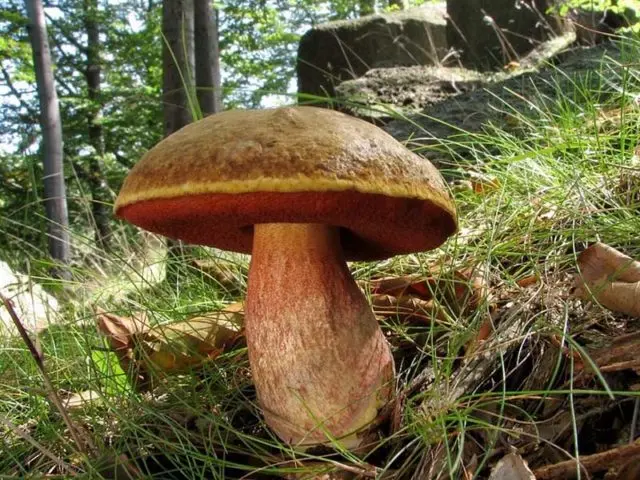
What do speckled oak mushrooms look like
To understand what a speckled oak tree looks like, it is necessary, in addition to the description, to carefully consider the photo. Moreover, you need to find out the features of each part of the fungus, since they have their own distinctive features.
head
In the speckled dubovik, the caps reach 20 cm. While the tannery is still small, it resembles a half of a ball. Then it becomes like a pillow. The skin is dry, velvety, mucus appears on the matte surface only after precipitation. Young fruits with a brown, yellowish-brown, chestnut or gray-brown cap. Old duboviks are distinguished by the fact that they have it dark, almost black.
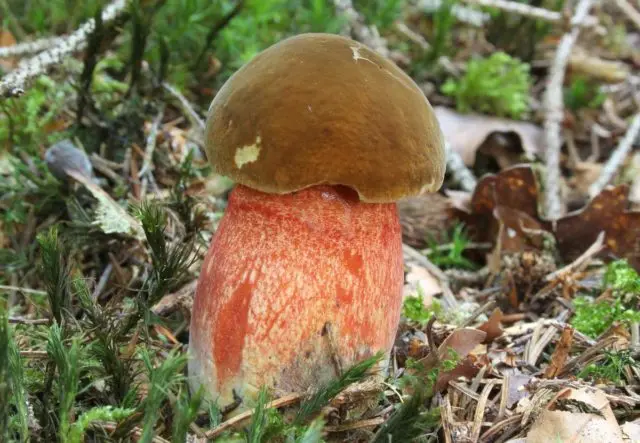
Leg
The leg grows up to 10 cm, in diameter – about 3 cm. This part of the speckled oak tree may resemble a barrel in shape. But most often it is tuberous with a thickening at the bottom. Red specks or scales are clearly visible on the orange surface.
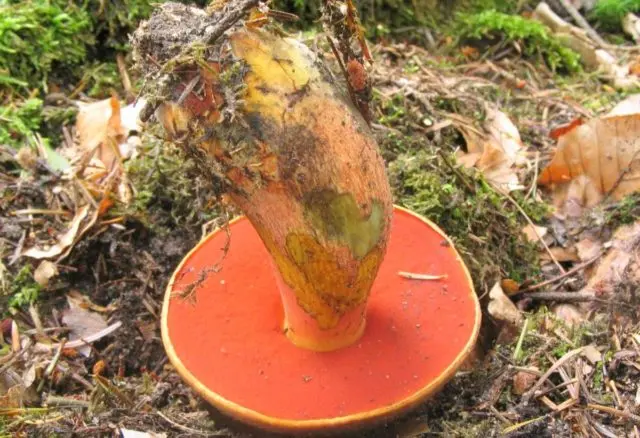
tubular layer
Dubovik speckled refers to tubular fungi. This layer is yellowish-olive in young fruits. As it grows, the color changes, becoming orange-red. If you press on the tubes, then blue appears.
Pulp
The grain-footed boletus is distinguished by dense, fleshy flesh. In the hat it is yellow, but when cut or broken, it rapidly turns blue. The flesh of the leg is brown-red. Spore powder of brown-olive color.
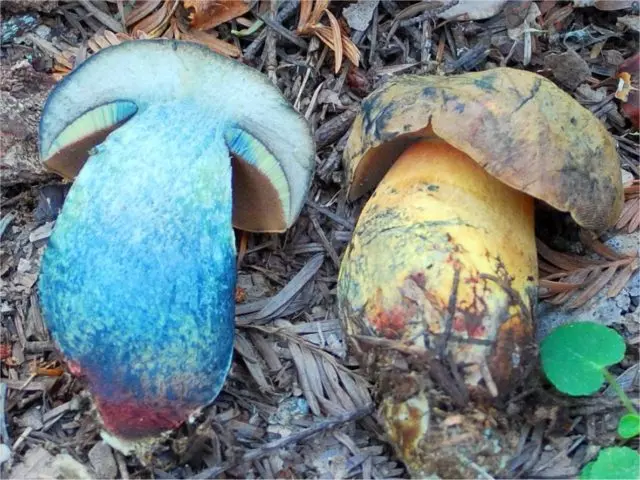
Where do speckled oak mushrooms grow
Mushroom pickers in central Our Country can rarely boast of an amazing find, since boletus mushrooms almost never grow here. But in the Leningrad region, Siberian forests, the Caucasus and Europe, you can quickly collect a basket of delicious mushrooms.
Mottled oak trees grow on acidic, marshy soils in coniferous or deciduous forests. The collection of poddubnikov begins in June, fruiting is long. Most of the grain-footed mushrooms grow in August-October, until frosts begin.
Dubovik speckled edible or not
The red-legged bolet is classified as conditionally edible. It should be eaten only after preliminary boiling. Mushrooms can be salted, dried, boiled and pickled.
Dubovik speckled tasty and healthy. It contains a lot of trace elements necessary for humans:
- Iron helps maintain hemoglobin levels.
- Copper helps form pituitary cells.
- Zinc improves the functioning of the digestive system and metabolic processes.
The presence of useful substances improves immunity, strengthens the heart and blood vessels, helps to normalize blood pressure. And this, in turn, protects a person from atherosclerosis. Antioxidant, antiviral and anti-inflammatory properties are also inherent in speckled oak trees.
False twins of speckled tanners
The speckled oak tree has twins that are similar to it in appearance and in other ways. There are edible and inedible representatives among them:
- oak tree olive-brown;
- Kele oak tree;
- satanic mushroom
olive brown
This is an edible mushroom with a hemispherical, convex hat of olive-brown color. Its surface is velvety. The leg resembles a pin. Above – yellow-orange, in the lower part – with a red-brown tint, where the mesh is clearly visible.
The mushroom is distinguished by yellow dense pulp, which turns blue when cut. She exudes a pleasant aroma. Grows in mixed and deciduous forest.
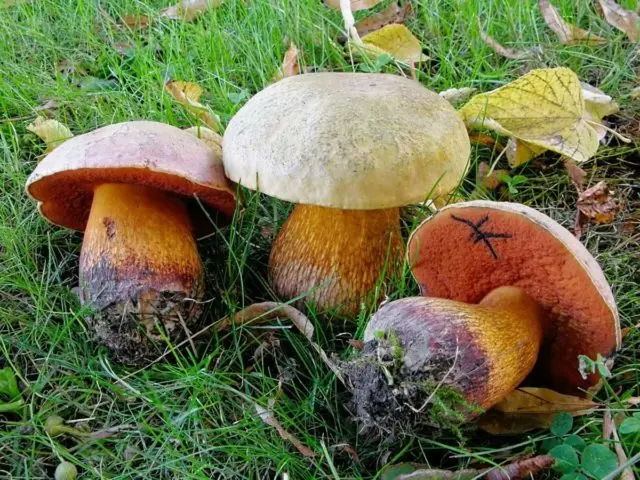
Coming
Conditionally edible species with a rounded convex hat of chestnut color. Features a smooth velvety surface. It grows on a yellow-brown stalk in the shape of a cylinder and with a slight thickening near the ground, there is no pattern.
The dense yellow pulp does not have the characteristic mushroom aroma. On the cut, blue quickly appears.
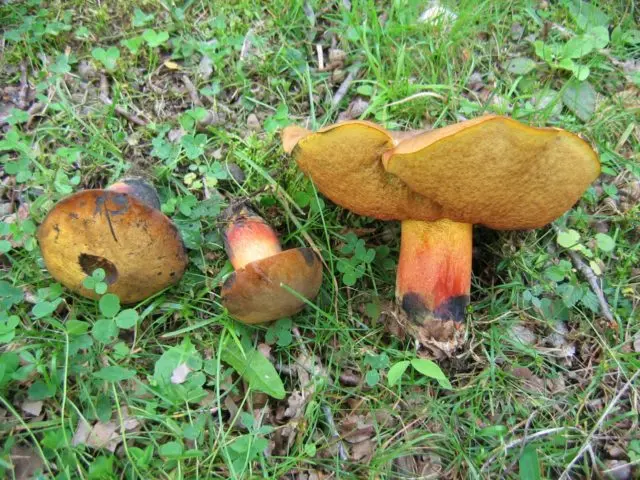
Satan’s Mushroom
The worst thing is if, instead of a tannery, there is a poisonous satanic mushroom in the basket. It also changes color on the cut. But the watery flesh or legs first turn blue and then turn red. His hat is white.
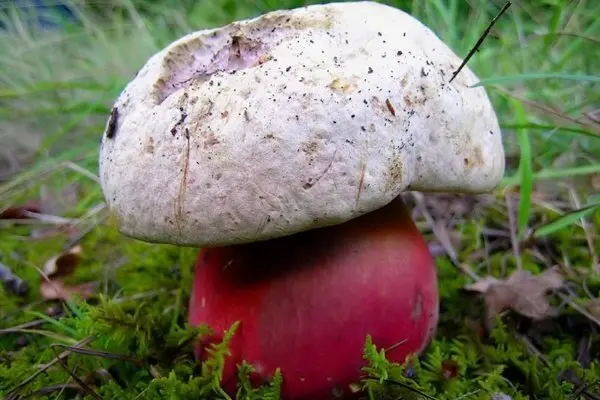
Collection rules
It is necessary to cut off the speckled oak trees with a sharp knife near the ground itself, so as not to destroy the mycelium and not to deprive the forest of the future harvest. Collect small or medium mushrooms. It is better to refuse old, overgrown ones. Cut speckled oak trees are shaken off the ground and put into a basket.
How to cook speckled oak
Mottled oaks are valuable mushrooms that have an excellent taste. But since they are conditionally edible, before preparing various dishes, they are boiled twice for 15 minutes, each time changing the water.
Poddubniks can be used to prepare:
- mushroom soup;
- fried foods;
- marinated;
- brine;
- mushroom paste.
Conclusion
Dubovik speckled is valued for its beneficial properties and taste. Real gourmets open a quiet hunt for him. It is a pity that not all residents of Our Country will be able to enjoy these forest fruits.









